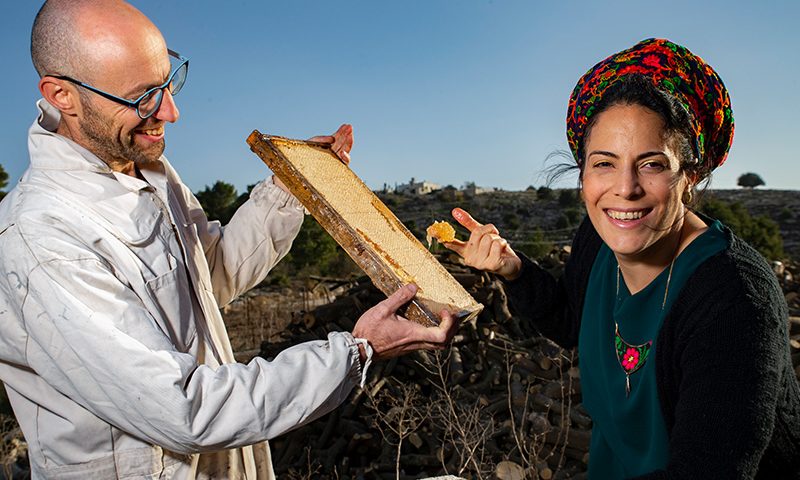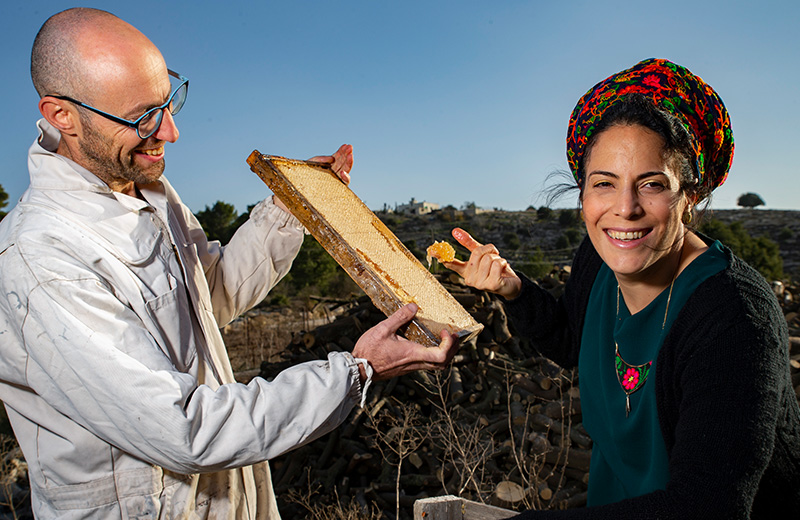If you were allergic to bees, you probably wouldn’t prioritize honey-making. Shimrit Feuchtzanger, 39, thought otherwise. She and her husband, Baruch, co-manage Negohot Bee Farm in Israel’s Lakhish region in harmony and peace. However, one routine car ride almost cost Shimrit her life.
"I got into Baruch's car one day", Shimrit says. "I didn't notice that a bee had crept into the car - and it stung me”. Within minutes, she became intensely dizzy and had difficulty breathing. Fortunately, she managed to get to a nearby hospital before the symptoms became life-threatening. “A delay of a few minutes and I wouldn’t be sitting here today", she recalls.
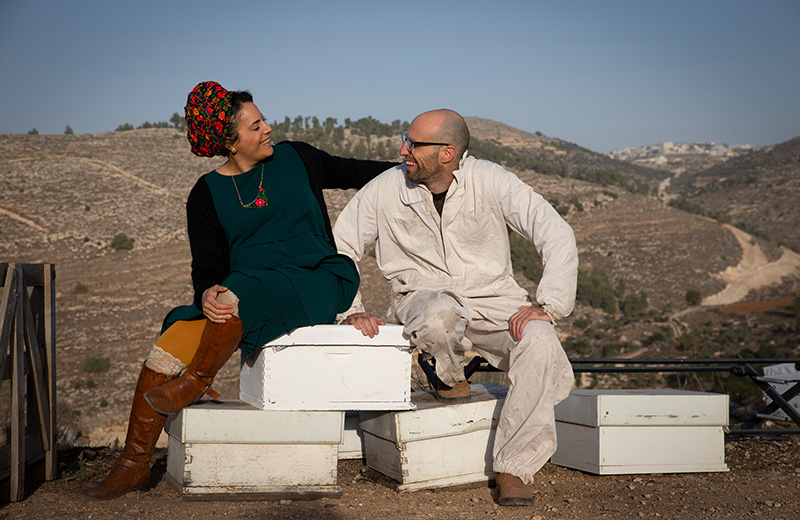 Despite the incident, Shimrit decided that her future was in the honey-making industry. "I immediately decided that bees and I are more connected now than ever before", she says.
Despite the incident, Shimrit decided that her future was in the honey-making industry. "I immediately decided that bees and I are more connected now than ever before", she says.
Don't Give Up Any Bit of Honey
The story of Negohot Bee Farm began with the 2005 Gush Katif evacuation, where the Feuchtzanger couple had lived until the disengagement. Uprooting their lives and starting over led them to an unconventional choice. "My dad raised bees many years ago and I worked for him on vacations," Baruch recalls. "When we were thinking about starting a business, the idea of beekeeping came up and we both loved it”.
The two didn't want to settle for a regular business. Their honey would be special – it wouldn’t be heated, as is customary in the industry (when honey is removed from its hive, its temperature drops and it thickens, leading many beekeepers to heat it to return it to its original liquid state). "The heating affects the nutritional values and taste of the honey, and we want to keep both completely natural," Feuchtzanger explains.
Negohot doesn’t cut corners. Many honey makers fool bees by placing sugar water, which resembles nectar, nearby so they use it to produce the honey. At Negohot, on the other hand, the bees feed entirely on flowers, ultimately decreasing their output.
"At the end of the day, you might work year-round but only reap three weeks worth of honey because the bees get cold”, Shimrit says. "We’d double our output if we were willing to give up '100 percent pure honey’. But that’s out of the question for us. We’re not just making honey here. We’re formulating an idea, a story; a connection between the Land of Israel, the people and the product. When you buy our product, you’re buying our story, too. You become part of it and part of the Holy Land”.
The Secret behind the White Honey
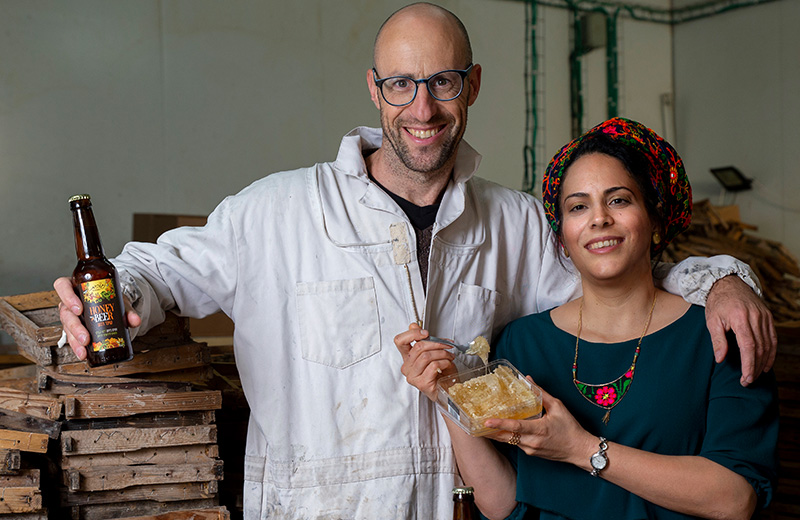 Output is only one of the challenges Baruch and Shimrit face. Alongside managing the business, the couple maintains a religious lifestyle while also raising their six children. In order to achieve it all, they wake up at 4:00 AM every day, pray, prepare their children for the day and then disperse them to their respective schools.
Output is only one of the challenges Baruch and Shimrit face. Alongside managing the business, the couple maintains a religious lifestyle while also raising their six children. In order to achieve it all, they wake up at 4:00 AM every day, pray, prepare their children for the day and then disperse them to their respective schools.
The security situation poses additional challenges, making each customer vitally important – every order is a world unto itself. "We’re surrounded by Arab villages and cities and it’s not always easy to live here, but this is an amazing and unique Israeli community", says Shimrit. “The air is wonderful and our bees enjoy the best flowers. You can buy honey in Italy, too – their orchards aren’t too shabby. But honey from the Land of Israel has a one-of-a-kind taste. Israeli products are like nothing else – this is a huge mission for us".
Back home in Negohot, Shimrit lays homemade products on her living room table. She rushes to the kitchen, returning with a cup of hot tea mixed with a single teaspoon of honey. "We have citrus honey, eucalyptus honey, avocado honey, wildflower honey, desert flower honey and more", she notes rapidly as she spreads seven tasting spoons out. “We also have new products made from honey. We’ve made face and hand creams and we have a beer made from honey – it’s a great solution for Passover for those who keep kosher, and it’s also healthy”.
On the shelf in the kitchen, next to the steaming soup pot, stands a mysterious white jar. "That’s our white honey!" Shimrit exults, leaping to immediately pull out a new tasting spoon. Accidentally created during a previous season, the white honey came to be in great demand before long. However, the Feuchtzangers had no clue how to replicate it, so they took it to a Tel Aviv University professor, who examined the nectar and pollen and found the type of flowers which make it possible to produce the unique honey. Since then, the Feuchtzangers have closely monitored these flowers, hoping that the bees help restore their great success.
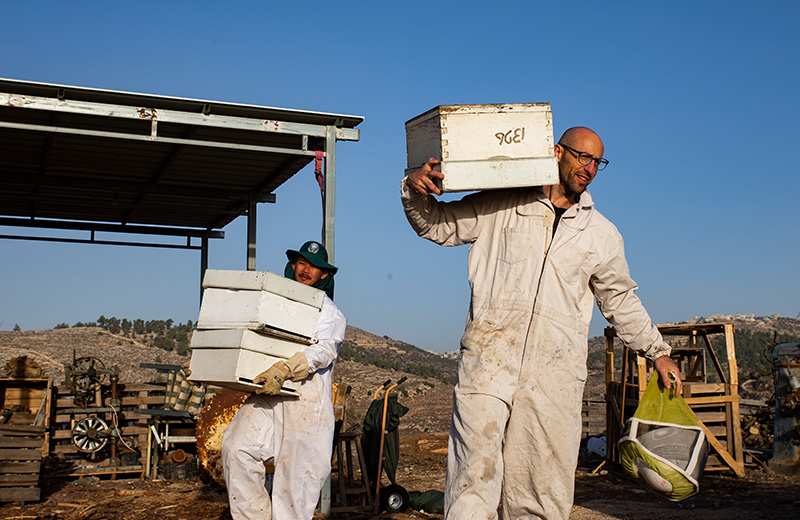 The Feuchtzanger couple ends the day at a viewpoint located atop their community. On a clear day, the coast of Rafah is visible from here. With a little bit of effort, one can even spot the old house that the family left behind in Gush Katif. "We came here because of the air", Baruch says. "We stayed because we fell in love with the place, the quality of life and the quiet. This is not a simple business, and we appreciate every costumer and every product bought. Just recently, thieves stole roughly 100,000 shekels-worth of our hives. We also deal with the always-changing weather and the marketing challenges”.
The Feuchtzanger couple ends the day at a viewpoint located atop their community. On a clear day, the coast of Rafah is visible from here. With a little bit of effort, one can even spot the old house that the family left behind in Gush Katif. "We came here because of the air", Baruch says. "We stayed because we fell in love with the place, the quality of life and the quiet. This is not a simple business, and we appreciate every costumer and every product bought. Just recently, thieves stole roughly 100,000 shekels-worth of our hives. We also deal with the always-changing weather and the marketing challenges”.
Operating in the small Israeli market, small businesses have a hard time surviving over time unless they manage to sell their product internationally. Baruch explains, “It’s not simple to deal with BDS, which operates in full force to prevent people from purchasing Israeli products or gifts. But we’re glad that our honey is sold both in Israel and overseas. When a customer buys our honey, he or she helps us stay here. Our honey’s not cheap, but it’s made from the flowers of the Holy Land. Worth spending a little extra for the land flowing with milk and honey, right?"

